 Petzlover
Petzlover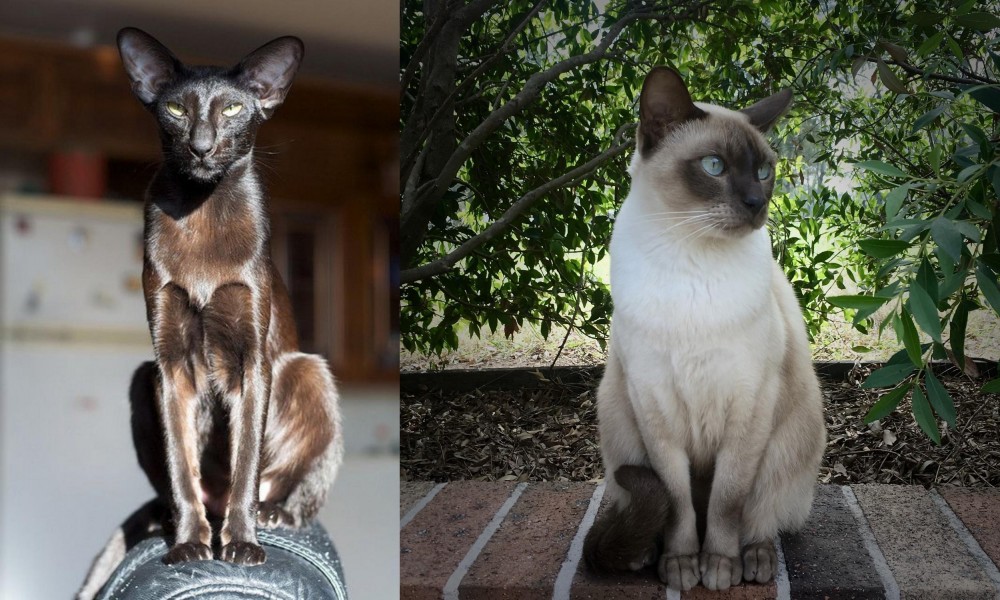 Oriental Shorthair is originated from United Kingdom but Tonkinese is originated from Canada. Both Oriental Shorthair and Tonkinese are having almost same weight. Oriental Shorthair may live 3 years less than Tonkinese. Both Oriental Shorthair and Tonkinese has same litter size. Oriental Shorthair requires Low Maintenance. But Tonkinese requires Moderate Maintenance
Oriental Shorthair is originated from United Kingdom but Tonkinese is originated from Canada. Both Oriental Shorthair and Tonkinese are having almost same weight. Oriental Shorthair may live 3 years less than Tonkinese. Both Oriental Shorthair and Tonkinese has same litter size. Oriental Shorthair requires Low Maintenance. But Tonkinese requires Moderate Maintenance
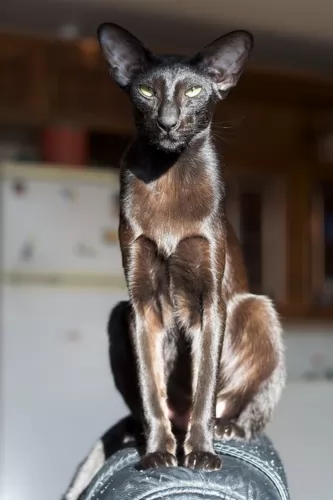 This domestic cat is also related to the Siamese Cat. Orientals come from a diverse group of cats, but they have their foundation in the Siamese breed.
This domestic cat is also related to the Siamese Cat. Orientals come from a diverse group of cats, but they have their foundation in the Siamese breed.
The cat was imported from Thailand to the UK during the 1800s. This particular cat was accepted as an actual breed in 1977. Quite a few of the top cat organizations recognize the Oriental Shorthair but as a Siamese.
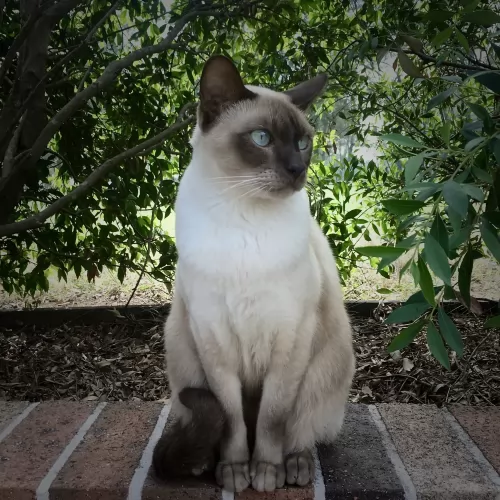 It was about in 1960 that a breeding program was established for these cats. The Tonkinese is a cat that hails from Canada and it was a certain Jane Batlett who was responsible for breeding this cat.
It was about in 1960 that a breeding program was established for these cats. The Tonkinese is a cat that hails from Canada and it was a certain Jane Batlett who was responsible for breeding this cat.
Also, Margaret Conroy, another breeder, set up her breeding program between a Burmese female with a Siamese. Both Conroy and Bartlett worked together on the breed and the Tonkinese came about. The Cat Fanciers Association recognized this cat breed in 1984.
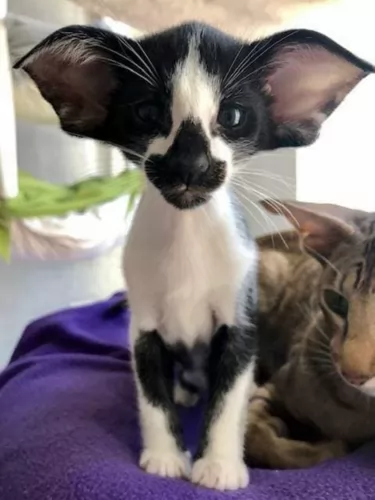 The Oriental Shorthair has a longish head with a slender neck and large ears. The legs are long and slender. The medium-sized cat weighs in the region of 3 – 5kg.
The Oriental Shorthair has a longish head with a slender neck and large ears. The legs are long and slender. The medium-sized cat weighs in the region of 3 – 5kg.
The eyes can be blue or green. Sometimes the cat will have one blue eye and one green eye. The coat is short and smooth and can be in a host of different colors.
The Oriental Shorthair is a curious, intelligent cat and they’re talkative too, loving to have conversations with their human family. They are cats that absolutely want to be part of the family. They don’t want to be left alone for too long either and get on well with children and pets in the home.
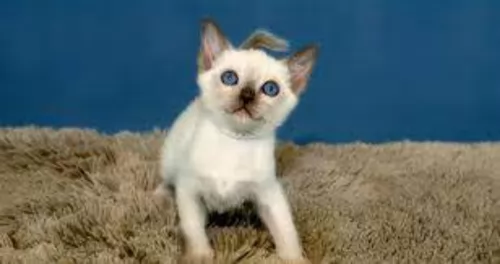 As a medium-sized cat, with a firm, muscular body, your Tonkinese will weigh between 2.5 – 6kg.The head is slightly rounded with fairly broad ears that are set wide apart.
As a medium-sized cat, with a firm, muscular body, your Tonkinese will weigh between 2.5 – 6kg.The head is slightly rounded with fairly broad ears that are set wide apart.
The eyes are bigger than the classic Oriental shape and can range from green to light blue in color.
The coat of the Tonkinese is short and close-lying and is soft and silky to touch. The mask, the ears, legs and tail are all darker than the body.
The Tonkinese cat breed is recognized by the Cat Fanciers' Association in 4 base colors - medium brown, champagne, blue and and platinum.
The Tonkinese cat, with one of its parents being the Siamese cat, just loves giving and receiving attention.
Active and social, he is an excellent choice for families with children and even other pets. They love just seeking out their human companions and lying down where they are.
They’re intelligent felines these, and you can even teach them some simple commands. Because of them being so very social, they don’t like to be left on their own – certainly not for the whole day while you go off to work.
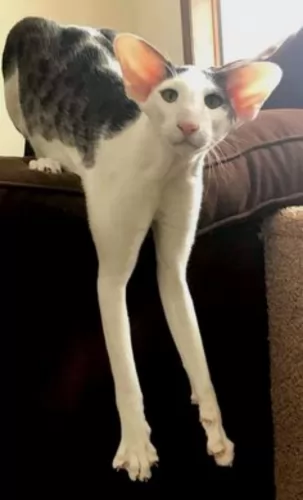 The Oriental Shorthair promises to be an active companion in your life. It’s a cat that likes to involve itself with all the activities that its human family takes part in.
The Oriental Shorthair promises to be an active companion in your life. It’s a cat that likes to involve itself with all the activities that its human family takes part in.
He is a great entertainer too, and he loves all the attention he gets, thriving on being the center of attention.
The Oriental Shorthair cat is slightly more quieter than the Siamese cat but he will still want to tell you what he’s doing and what he wants.
It’s a cat that has many many colors and shades, but the color extends to the cat’s personality. It has a colorful, interesting, inquisitive personality.
The cat is lively and social and will fit in best with a lively, active home where there are also animals to keep him company. By having this loving cat in your home and life, you bring in joy and happiness.
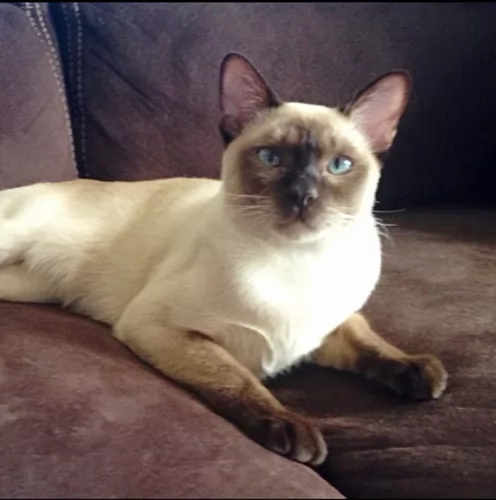 Tonkinese cats can be active and highly entertaining with their antics. When you laugh at them, they are encouraged to perform more.
Tonkinese cats can be active and highly entertaining with their antics. When you laugh at them, they are encouraged to perform more.
They are affectionate and intelligent cats and you will need to have toys for him. When he isn't playing, he likes nothing more than to be petted and pampered by his human family.
Your Tonkinese will get on well with children and other pets, and he generally makes a splendid pet for those who care well for him.
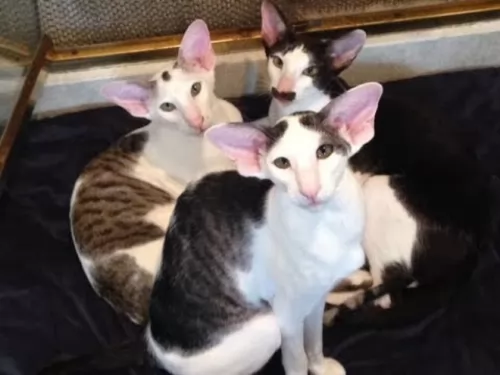 Oriental Shorthairs share some of the same health issues as Siamese cats. Make sure, if your cat shows signs of illness that you have pinpointed a vet in your area.
Oriental Shorthairs share some of the same health issues as Siamese cats. Make sure, if your cat shows signs of illness that you have pinpointed a vet in your area.
Things such as asthma, bronchial disease, lymphoma, neurological disorders, and gastrointestinal problems will need to be seen by the vet.
Think about having your cat spayed or neutered. Not only is this surgery important for preventing unwanted pregnancies, but it can also remove the urge for the cat to roam. The procedure has health benefits for your cat too.
Ensure that your Oriental shorthair has his vaccines up to date. These vaccines are important for preventing your cat from getting some deadly feline diseases. Kittens usually get the first vaccines between the ages of 6 and 8 weeks. Certainly, if you decide to go on holiday and you want to board your cat, the boarding kennels will require that the vet’s card and vaccines are 100% up to date.
Prevent parasites by using a treatment subscribed for your pet by the vet.
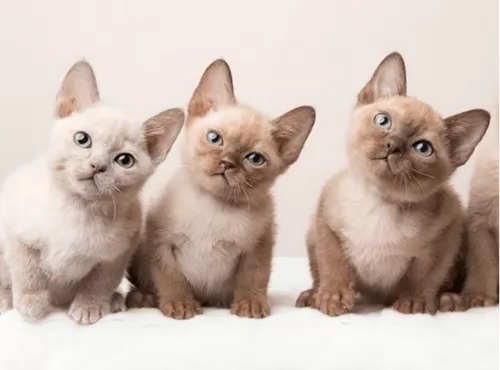 Tonkinese are generally healthy cats but they can be prone to eye problems such as gingvitis.
Tonkinese are generally healthy cats but they can be prone to eye problems such as gingvitis.
Because they are part of the Siamese family, they can succumb to some of the diseases that the Siamese battles with. These are asthma/bronchial disease, heart defects, lymphoma, and crossed eyes.
Lymphoma is linked with feline leukemia, a viral infection, and thankfully, more cats are being vaccinated for feline leukemia, so fortunately it is becoming less common.
Intestinal lymphoma affects the gastrointestinal tract and is the most common type of lymphoma in cats, being more common in older cats. Affected cats can suffer with weight loss, vomiting, and diarrhea. Get your cat to the vet as diagnosing this lymphoma will require the vet finding cancerous cells on microscopic examination.
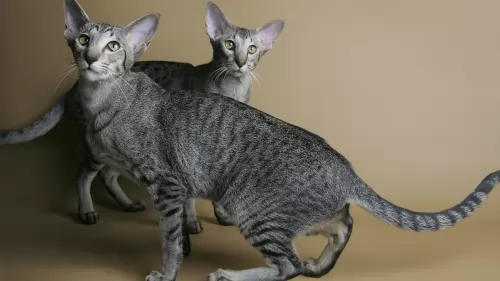 The short glossy coat doesn't shed much and the cat is considered low maintenance. A brush once a week will be adequate. A wipe down with a damp cloth will keep the cat dust-free and shiny.
The short glossy coat doesn't shed much and the cat is considered low maintenance. A brush once a week will be adequate. A wipe down with a damp cloth will keep the cat dust-free and shiny.
Just doing this for your cat is good for the cat’s morale as he thrives on attention, relishing the human interaction he gets during grooming.
Trim his nails, particularly if he is an indoor cat.
Keep your Oriental Shorthair lean and mean by not overfeeding him. The cat’s build is designed for slimness and he won't do at all well with the extra weight. The extra weight can lead to lots of health problems, one of which is diabetes.
If in any doubt as to how much to feed your cat, consult your vet about portion sizes. There are excellent commercially manufactured cat foods on the market, and the manufacturers know that cats are carnivores and that the best cat goods are high in protein.
Avoid giving your cat any kind of human food. Never leave him without a constant supply of fresh, cool water.
Provide your cat with a litter box and keep the box free of cat droppings. You can invest in small rakes from the pet shop and they make it easy to rake up the feces and dispose of them. Change the litter regularly too.
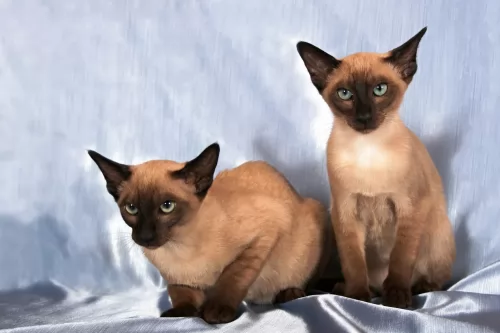 The Tonkinese has a short coat so a brush once a week will be sufficient for this cat as it just helps to brush away dust and loose hairs.
The Tonkinese has a short coat so a brush once a week will be sufficient for this cat as it just helps to brush away dust and loose hairs.
He will need a litter box and this will need to be kept spotlessly clean. Use a small rake, available from your vet or local pet shop, to rake up the cat’s feces.
When you first bring your Tonkinese cat home, you will at least need some of the basics to ensure his wellbeing. These are -
sleeping equipment – baskets or cushions in a nice warm, dry place for your cat.
A cat tree for climbing and a scratching post. Cats are natural scratchers so you can’t get angry with your cat for scratching. Instead, invest in a scratching post so that he doesn’t use your furniture to scratch on.
Food is such an important part of caring for a cat. The best type of cat food can ensure your cat has a strong immune system that allows him to not succumb to every cat sickness there is.
Cats are carnivores so ensure he has food high in meat. Sometimes it can be costly, but try to provide your cat with the best, most high-quality cat foods there are to ensure his good health and happiness.
A cat needs a constant supply of fresh, cool water night and day. The water should be changed regularly.